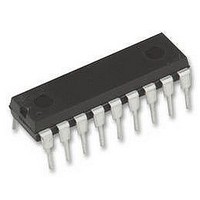Description:
Ideally suited for interfacing between low−level digital logic circuitry and high−power peripheral loads,
the NTE2011 through NTE2015 are high−voltage, high−current Darlington arrays in an 18−Lead DIP
type package and feature peak load current ratings to 600mA (NTE2016, NTE2019) or 750mA
(NTE2017, NTE2018, NTE2020) for each of the eight drivers in each device. Under the proper condi-
tions, high−power loads up to 4A at 50V (200W at 23% duty cycle) or 3.2A at 95V (304W at 33% duty
cycle) can be controlled. Typical loads include relays, solenoids, stepping motors, multiplexed LED
and incadescent displays, and heaters. All devices feature open collector outputs and integral diodes
for inductive load transient suppression.
The NTE2016 is a general purpose array that may be used with standard bi−polar digital logic using
external current limiting, or with most PMOS or CMOS directly. This device is pinned with outputs
opposite inputs to facilitate printed wiring board layouts.
The NTE2017 is designed for use with 14V to 25V PMOS devices. Each input has a Zener diode and
resistor in series to limit the input current to a safe value in that application. The Zener diode also gives
this deVicee excellent noise immunity.
The NTE2018 has a 2.7kΩ series base resistor for each Darlington pair, allowing operation directly
with TTL or CMOS operating at a supply voltage of 5V. This device will handle numerous interface
needs − particularly those beyond the capabilities of standard logic buffers.
The NTE2019 has a 10.5kΩ series input resistor that permits operation directly from CMOS or PMOS
outputs utilizing supply voltages of 6V to 15V. The required input current is below that of the NTE2018,
while the required input voltage is less than that required by the NTE2017.
The NTE2020 is designed for use with standard TTL and Schottky TTL, with which higher output cur-
rents are required and loading of the logic output is not a concern. This device will sink a minimum
of 350mA when driven from a “totem pole” logic output.
Absolute Maximum Ratings: (T
Output Voltage, V
Input Voltage, V
Continuous Collector Current. I
Continuous Base Current, I
Power Dissipation, P
Operating Ambient Temperature Range, T
Storage Temperature Range, T
Note 1. NTE2017 and NTE2020 are discontinued devices and no longer available.
Note 2. Derate at the rate of 18.18mW/°C above +25°C.
Note 3. Under normal operating conditions, these devices will sustain 350mA per output with
NTE2017, NTE2018, NTE2019
NTE2020
NTE2016, NTE2019
NTE2017, NTE2018, NTE2020
One Darlington Pair
Total Device (Note 2)
V
CE(sat)
NTE2016/NTE2017/NTE2018/NTE2019/NTE2020
IN
. . . . . . . . . . . . . . . . . . . . . . . . . . . . . . . . . . . . . . . . . . . . . . . . . . . . . . . . . . . . . . . . . . . .
= 1.6V at +50°C with a pulse width of 20ms and a duty cycle of 40%.
CE
D
. . . . . . . . . . . . . . . . . . . . . . . . . . . . . . . . . . . . . . . . . . . . . . . . . . . . . . . . . . . . . . . .
8−Channel Darlington Array/Driver
B
. . . . . . . . . . . . . . . . . . . . . . . . . . . . . . . . . . . . . . . . . . . . . . . . . . . . . . .
. . . . . . . . . . . . . . . . . . . . . . . . . . . . . . . . . . . . . . . . . . . . . . . . . . . . . . . . . .
. . . . . . . . . . . . . . . . . . . . . . . . . . . . . . . . . . . . . . . . . . . . . . . . . . . . . . .
. . . . . . . . . . . . . . . . . . . . . . . . . . . . . . . . . . . . . . . . . . . . . . . . . . . . . . .
C
stg
A
= +25°C for any one Darlington pair unless otherwise specified)
. . . . . . . . . . . . . . . . . . . . . . . . . . . . . . . . . . . . . . . . . .
Integrated Circuit
. . . . . . . . . . . . . . . . . . . . . . . . . . . . . . . . . . . . . . . . . . . . . . . .
. . . . . . . . . . . . . . . . . . . . . . . . . . . . . . . . . . . . . . . . . . . . .
A
. . . . . . . . . . . . . . . . . . . . . . . . . . . . . . . . . . .
−55° to +150°C
−20° to +85°C
500mA
600mA
2.25W
25mA
50V
30V
15V
1W






